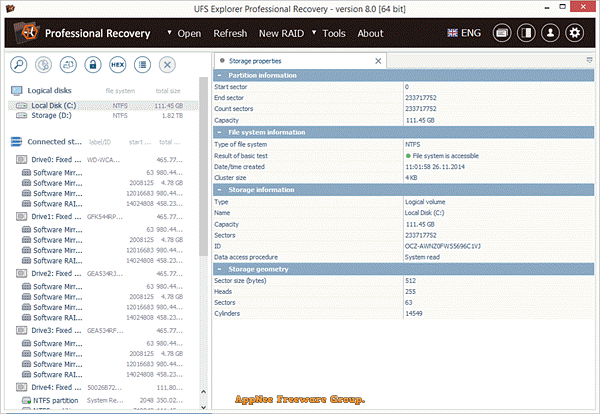| Ⅰ | This article along with all titles and tags are the original content of AppNee. All rights reserved. To repost or reproduce, you must add an explicit footnote along with the URL to this article! |
| Ⅱ | Any manual or automated whole-website collecting/crawling behaviors are strictly prohibited. |
| Ⅲ | Any resources shared on AppNee are limited to personal study and research only, any form of commercial behaviors are strictly prohibited. Otherwise, you may receive a variety of copyright complaints and have to deal with them by yourself. |
| Ⅳ | Before using (especially downloading) any resources shared by AppNee, please first go to read our F.A.Q. page more or less. Otherwise, please bear all the consequences by yourself. |
| This work is licensed under a Creative Commons Attribution-NonCommercial-ShareAlike 4.0 International License. |

UFS Explorer is a full-featured and fast data recovery and file undeleting program for Windows, Mac and Linux platforms, developed by SysDev Laboratories from Ukraine. It can recover various types of data lost in computers due to various reasons, supports various storage devices, supports all commonly used file systems on various operating systems, and can even restore files in virtual machines.
As an expert-level tool that was created to solve highly complex data recovery challenges, UFS Explorer successfully combines low-level data analysis and data management functions with advanced data recovery tools. With its help, you can perform thorough and full-scale data recovery. It includes a set of read-only data analysis tools, and a writable hex editor, which can correct file system corruption. If desired, UFS Explorer’s low-level tools allow permanent changes to the original information contained on the storage device.
In addition to linear storage media such as hard drives, thumb drives, and memory cards, UFS Explorer can also handle RAID-based storage devices with various layouts, including standard, nested, custom, and specific configurations such as Beyond Raid, Synology Hybrid RAID, Btrfs-RAID, and ZFS RAID-Z. Its built-in decryption algorithms make it possible to open volumes encrypted with BitLocker, LUKS, FileVault 2 and APFS, without having to unlock them in the operating system. It supports numerous file systems under various operating systems, provides direct access to their contents, and supports various storage technologies. In addition, UFS Explorer supports various virtualization systems such as VMware, Hyper-V, VirtualBox, QEMU, Xen and disk images in many formats.
// Key Features //
| General features |
|
| Supported technologies |
|
| Work with defective disks |
|
| Operating systems for installation |
|
| Data recovery |
|
| Data access |
|
| RAID support |
|
| Additional functions |
|
| Interface |
|
// Supported File Systems //
| Data access and advanced recovery |
|
| Data access only |
|
// Supported Encryption Techniques //
- Full-disk encryption
- LUKS encryption
- Apple FileVault 2 encryption
- Encryption of Apple APFS volumes
- File system conversion (eCryptFS)
- BitLocker and BitLocker To Go encryption
// Supported Virtual Technologies //
- VMware VMDK, Hyper-V VHD/VHDX, QEMU/XEN QCOW/QCOW2, VirtualBox VDI, Apple DMG, Paralles, EnCase E01 and Ex01 non-encrypted files, simple disk images
- Internal sparse format
- Support of drive as a disk image (for XEN and others)
- Synology Sparse iSCSI
- Opening a partition/file within a storage as a virtual disk
- Support of split DeepSpar DDI images
- Custom “virtual image” files of Runtime Software
- R-Studio image files (RDR file format)
- Dynamic definition of virtual bad blocks on disk images using an external map or by recognizing a given pattern
- Work with disk images created by MRT data recovery tools (sorting and combining file image chunks into an image file)
// Supported Storage Technologies //
| Full support |
|
| Recognition |
|
// Official Demo Video //
// Universal Registration Codes //
| For | Registration name | Registration code |
| v8.x.x | AppNee Freeware Group. | C3U32AB1-0743A898-D23FA35E-2B80A353-8B869056-550FBF3B |
| v9.x.x | P3U33835-44452120-C341AE67-10BEB33C-B480B4C2-C3035B2B |
// Edition Statement //
AppNee provides the UFS Explorer Professional Recovery Edition multilingual full installers and universal registration codes, as well as portable full registered versions for Windows 32-bit and 64-bit.
// Installation Notes //
for v9.18.0 setup versions on Windows:
- Download and install UFS Explorer
- Copy the corresponding unlocked file to installation folder and overwrite
- Run program, click the “Software Activation and License” icon at the upper right corner, and use the universal registration code above to register
- Done
for v8.16.0 setup versions on Windows:
- Download and install UFS Explorer
- Run program, click the “Software Activation and License” icon at the upper right corner, and use the universal registration code above to register
- Done
// Prompts //
- You man need to run UFS Explorer as administrator.
// Related Links //
- UFS Explorer Editions Comparison
- UFS Explorer User Manual
- UFS Explorer Knowledge Base
- UFS Explorer F.A.Q.
// Download URLs //
| License | Version | Download | Size |
| for Windows | |||
| Professional Recovery Edition | v8.16.0 | reserved | 13.8 MB |
| v9.18.0 | reserved | 32.9 MB | |
| v10.0.0 | MB | ||
(Homepage 1 | Homepage 2)
| If some download link is missing, and you do need it, just please send an email (along with post link and missing link) to remind us to reupload the missing file for you. And, give us some time to respond. | |
| If there is a password for an archive, it should be "appnee.com". | |
| Most of the reserved downloads (including the 32-bit version) can be requested to reupload via email. |